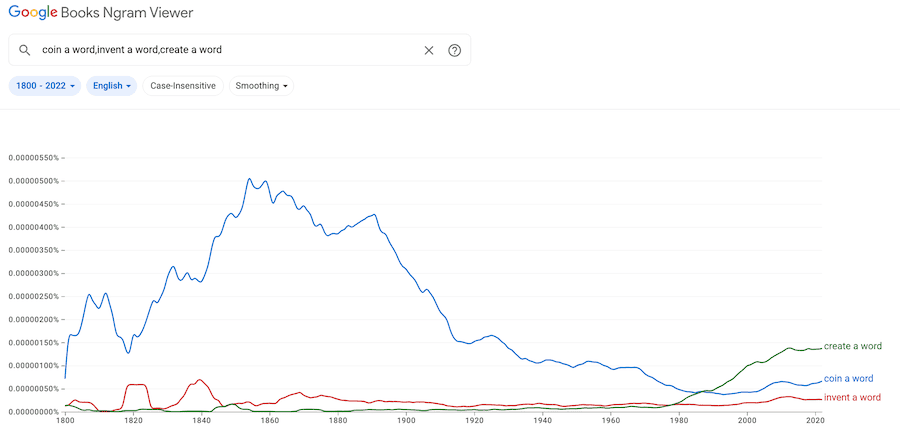
When talking about language and vocabulary evolution, we usually say that new words are coined, not invented or created.
The phrase sounds a little odd because people invent machines, create stories, and discover new cures, so why do we treat new words differently?
In part, the answer lies in the history of the word coin, but also how collocation works in language that creates word pairs that sound right.
But how did this odd pairing of coin a phrase or coin new words come about, and why has it been in use for centuries?
The origins of the word and verb coin
As soon as you see the word coin, you naturally think of money and small, flat pieces of stamped metal.
But in centuries past, writers and speakers started using the word coin in a new way, applying it to words and phrases rather than currency.
You only need to visualize a new coin coming from a mint that is new, shiny, and ready for circulation.
That’s exactly the depiction writers took when they started to coin a new word.
Towards the end of the 16th century, scholars were using coin as a verb to mean the invention or fabrication of a word or phrase.
Perhaps it was because when you coined words, it had some sense of authority, as if it had been officially introduced into language.
It wasn’t simply an invention. It was something that was meant to circulate and remain.
Over time, collocation took over, making certain word pairings seem natural. New words are coined became one of them.
As I discovered when writing an article recently about a new word, I was tossing up between invented a word and created a word. But for some reason, it didn’t sound right to me.
I finally settled on coined, but it made me curious, which is why I decided to write this article.
The usage of the verb coin today
If you look up the word, you’ll see that coin as a verb is still there, but with only two definitions. One is to make coins, and the other is to invent a new word.
You might notice that coined is still used regularly in journalism, literature, and discussions or forums about language use.
For example, journalists may talk about someone who coined a phrase that caught on in politics, or perhaps, popular culture.
Writers and linguists also commonly use the original term when describing the creation of a word or phrase that has gained attention or recognition by dictionaries.
However, you probably don’t hear coin a phrase or word as often in everyday conversation. Most people might usually say, made up a word or created a word.
The reason is that coin as a verb is now somewhat idiomatic. It sounds normal when paired with words and phrases, but it has a formal or literary tone about it.
If you use invent a word in a sentence, you might think it sounds awkward, even if it is 100% grammatically correct.
However, the unnatural collocation might seem odd for a native speaker.
But interestingly, trends are moving over time.

You can see from the Google Ngrams image above that coin a word was dominant in the 19th century. But create a word appears more frequently in general texts now.
Does that mean coin is outdated? Not really, but it is perhaps a more specialized term today.
You’ll continue to see it in academic papers or articles about etymology, but perhaps less so in casual use such as on social media.
However, if you are a stickler for vocabulary, you’ll probably choose the traditional collocation.
Can you say invent a word?
Yes, it is grammatically correct, and people will easily understand what you mean.
However, it might sound a little odd to some readers.
Invent is usually reserved for new machines or gadgets rather than words.
The same goes for create a new word. The verb create is more commonly used for a new version of something, such as creating an account, a story, or a problem.
Of course, language changes over time, grammar rules become obsolete, and usage shifts with it.
As the graph earlier in this article shows, invent and create a new word or phrase are increasing in frequency compared to coin, the idiomatic choice.
This brings me back to when I wrote my article mentioning a new word that came into being in 1964.
Could I have stuck with invented? Perhaps, but I’m such a stickler for language and grammar.
Conclusion
Who is right, and who is wrong?
There’s never a yes or no answer when it comes to vocabulary, language use, and grammar.
What was accepted yesterday may be changed, modified, or abbreviated for use today and tomorrow.
New words are coined almost every day in English, and in fact, Cambridge added 6,212 new words in 2025.
So what should you use if you need to cover the topic of new words in an article, essay, or blog post?
I would have to say, go with what feels natural for you. After all, everyone will understand if you say invented, created, made up, or coined a new word.
Related Reading: Disinterested And Uninterested – Are You Interested?
Share This Article



What are the steps to coin a phrase or is that copyright?
Hello Veronica.
Anyone can coin a new phrase, but it needs to be picked up by others and used frequently.
As far as I know, there are no copyright issues with new and adopted phrases.